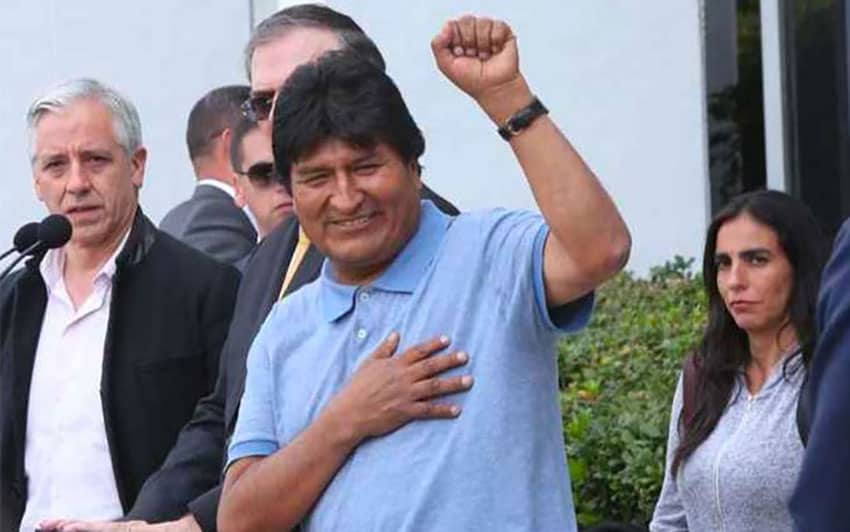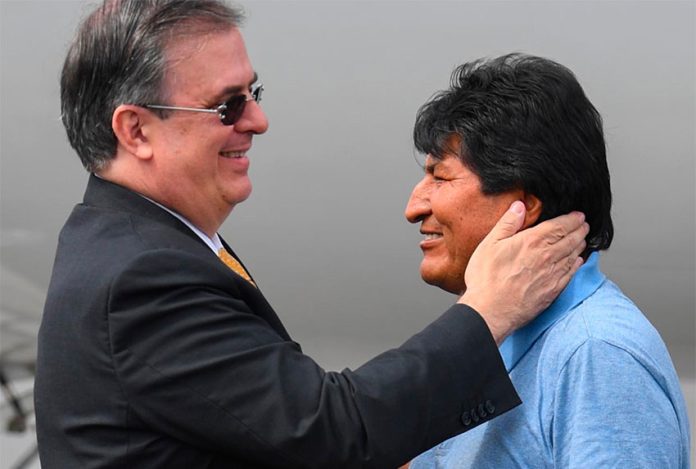Mexico has granted political asylum to former Bolivian president Evo Morales, who resigned this week under pressure from protests and the military after claiming victory in a disputed election held last month.
President López Obrador said on Tuesday that he personally took the decision to offer safe haven to Morales.
“Let it be clear . . . I gave the instruction to offer asylum,” he said. “I feel very proud to lead a government that guarantees the right to asylum, it’s a point of pride.”
But the decision has divided opinion in Mexico.
The hashtags #EvoBienvenidoAMéxico (Evo Welcome To Mexico) and #EvoNoEresBienvenidoEnMéxico (Evo You’re Not Welcome In Mexico) were the top trending topics on Twitter in Mexico City after the government announced that it would grant asylum to Morales.
The first indigenous leader of the South American nation arrived Tuesday on a Mexican Air Force plane at the Mexico City airport, where he was met by Foreign Secretary Marcelo Ebrard.
His arrival comes three weeks after a presidential election that was plagued by irregularities. Millions of Bolivians claim that the results were rigged in Morales’ favor.
After an audit by the Organization of American States found “clear manipulation,” the president on Sunday offered to hold fresh elections but it wasn’t enough to put an end to protests that had spread across the country.
After the head of Bolivia’s armed forces asked Morales to step down in order to restore peace, he announced his resignation in a televised address to the nation, stating that “our great desire is for societal peace to return.”
Mexico’s government immediately offered asylum to the leftist leader, who held power in Bolivia for almost 14 years. Along with leftist governments in several other Latin American countries, Mexico characterized the ousting of Morales as a coup.
President López Obrador and Morales have a history of friendship and mutual admiration.

The former, who before entering politics was an activist who fought for indigenous rights, wrote to the Bolivian president in 2010 to convey his “deep respect for the way in which you have been able to represent the noble, conscious and progressive people of Bolivia.”
After López Obrador was sworn in last December, Morales called his fellow leftist “the shining hope for the people of Mexico.”
The two men have also bonded over their shared disdain for neoliberalism.
The decision to grant asylum to Morales allows López Obrador “to reaffirm his leftist bona fides,” The Washington Post said, in a year in which he has ramped up enforcement against migrants at the behest of the United States and urged approval of the new North American trade deal.
“I am sure giving Morales asylum is the good thing to do,” Carlos Bravo Regidor, a political analyst, told The Post.
“But is it right for Mexican foreign policy interests? I don’t know. Where does this leave Mexico? Are we now part of the Bolivarian axis?”
Emilio Álvarez Icaza, an independent senator and former human rights activist, said he approved of the decision to grant asylum as long as it didn’t indicate tacit approval of the modification to the Bolivian constitution that allowed the former president to extend his rule beyond two terms.
Critics of López Obrador have claimed that the president’s intention to hold a revocation of mandate vote three years into his six-year term is part of a ploy to extend his rule beyond 2024.
“I hope that, with this, the Mexican government is not sending the message that there is ideological support for remaining in power beyond term limits,” Álvarez said.
“If this is only a humanitarian response, if it remains only that, I support it. But if the Mexican government wants to build from here in an effort to legitimize extending the mandate of López Obrador, I would raise my voice,” he added.
Juan Carlos Romero Hicks, leader of the National Action Party in the lower house of Congress, was scathing in his criticism of the government’s decision.
“Mexico has traditionally given asylum in our territory to those fleeing dictatorships. Now, they [the government] are not seeking to give asylum to those fleeing tyranny but . . . to the dictator himself!” he wrote on Twitter.
In contrast, the national secretary of the Democratic Revolution Party supported the asylum decision.
“Our international tradition of granting political asylum to . . . persecuted people materializes today in the case of former president Evo Morales. It’s the correct decision . . .” Ángel Ávila wrote on Twitter.
Foreign Secretary Ebrard told a press conference on Monday that the decision was taken for “humanitarian reasons” in light of the “emergency situation” in Bolivia, where he claimed Morales faced a risk to his life.
After touching down in Mexico City, Morales lent credence to that view, telling reporters that “the president of Mexico saved my life.”
He said that the day before his resignation, a member of the army showed him messages that indicated that there was a US $50,000 price on his head.
The former president didn’t reveal what he planned to do in Mexico or how long he intended to stay. In a Twitter post on Monday, Morales said that he would soon “return [to Bolivia] with greater strength and energy.”
Before meeting the ex-president at the airport, Ebrard told reporters at the presidential press conference that it will be up to Morales to decide where he will live and if he requires special protection from the National Guard.
“What Mexico is obliged to do is offer guarantees that he will be safe in our country, I don’t know the details because I haven’t spoken to him . . .” he said early on Tuesday.
Greeting Morales at the airport, Ebrard said: “Welcome, Evo . . . Regards from President López Obrador and all the people of Mexico. You will enjoy freedom, security . . . and protection of your life . . .”
Source: Milenio (sp), El Financiero (sp), The Washington Post (en)
